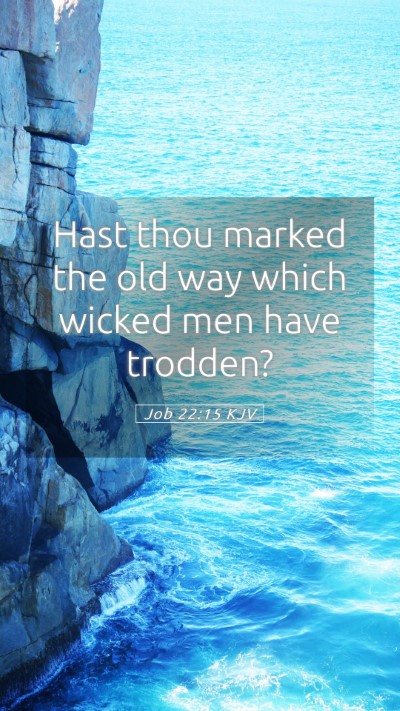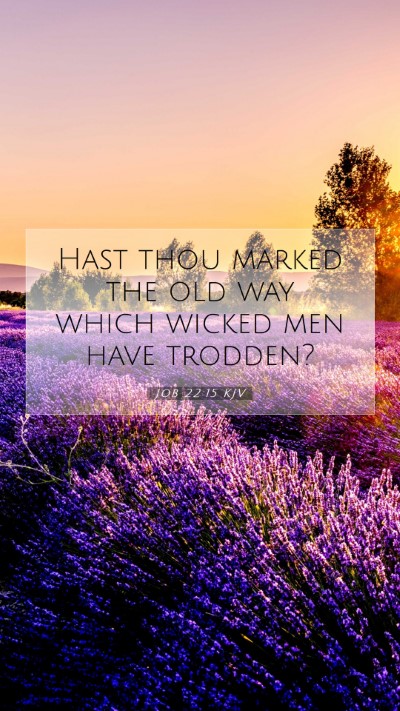Old Testament
Genesis Exodus Leviticus Numbers Deuteronomy Joshua Judges Ruth 1 Samuel 2 Samuel 1 Kings 2 Kings 1 Chronicles 2 Chronicles Ezra Nehemiah Esther Job Psalms Proverbs Ecclesiastes Song of Solomon Isaiah Jeremiah Lamentations Ezekiel Daniel Hosea Joel Amos Obadiah Jonah Micah Nahum Habakkuk Zephaniah Haggai Zechariah MalachiJob 22:15 Meaning
What is the meaning of Job 22:15?
Hast thou marked the old way which wicked men have trodden?
Job 22:15 Bible Verse Meaning
Bible Verse Analysis: Job 22:15
Job 22:15 states: "Will you keep to the old way that wicked men have trodden?" This verse raises important questions about righteousness, the path of the just, and the consequences of choosing to follow the ways of the wicked.
Understanding Job 22:15
This verse comes from the dialogue between Job and his friends, particularly Eliphaz, who is questioning Job's character and the validity of his plea for justice. Eliphaz represents a traditional view that suffering is a direct result of sin. The verse challenges Job to abandon the paths of the wicked, implying that adherence to such ways leads to destruction.
Bible Verse Meanings and Interpretations
Through the insights of public domain commentaries, we can gather an understanding of the underlying themes in this verse:
- Matthew Henry's Commentary: Henry emphasizes the importance of not following the ways of the wicked. He interprets Eliphaz's question as a rhetorical challenge to Job, implying Job ought to turn away from any similar ways he might have. Henry highlights that the 'old way' refers to accustomed paths of iniquity that lead to ruin.
- Albert Barnes' Commentary: Barnes elaborates on the moral implications of the verse, suggesting that there are 'old ways' that sinners have followed throughout generations. He argues for the necessity of wisdom and discernment in choosing one's path, contrasting the paths of the just with those of the unrighteous. Barnes posits that retaining the company of the sinners only brings about judgment and implies that Job should reflect on his integrity.
- Adam Clarke's Commentary: Clarke reflects on the philosophical dimensions of the verse, questioning whether Job has been led astray by peer influences. He ties the concept of 'old ways' to cultural and historical practices, warning against the complacency of following inherited sinful behaviors. Clarke stresses the need for a mindful reassessment of personal pathways.
Application of Job 22:15
In applying this verse to daily life, we are encouraged to critically evaluate the paths we choose. Eliphaz's challenge serves as a reminder that the ways of the wicked often promise comfort and familiarity but can ultimately lead to destruction. Believers should seek discernment and align their actions with righteousness, reflecting on the historical context of their choices.
In-Depth Bible Verse Analysis
Job 22:15 also invites readers to explore deeper theological themes such as:
- The Nature of Righteousness: How do choices reflect one's character?
- The Consequences of Sin: What results come from persisting in wicked ways?
- Judgment and Restoration: Can one return to a righteous path after straying?
Significant Cross References
Job 22:15 can be further understood through the following cross-references:
- Proverbs 4:14-15: "Do not enter the path of the wicked, and do not walk in the way of the evil." This verse reinforces the admonition about the dangers of following wicked paths.
- Psalm 1:1: "Blessed is the man who walks not in the counsel of the wicked." This highlights the consequences of choosing wise company versus the wicked.
- Jeremiah 6:16: "Stand by the roads, and look, and ask for the ancient paths." This verse suggests the idea of reflection and choosing paths wisely.
Conclusion
Job 22:15 serves as a profound contemplation of human morality and the choices that define our lives. As we engage in Bible study, we must focus on Bible verse meanings and seek Bible study insights that encourage righteous living and reflection on our paths. Overall, this verse is a call to evaluate life choices through a moral lens, engage in Bible verse interpretations, and understand its significance in our spiritual journey.


